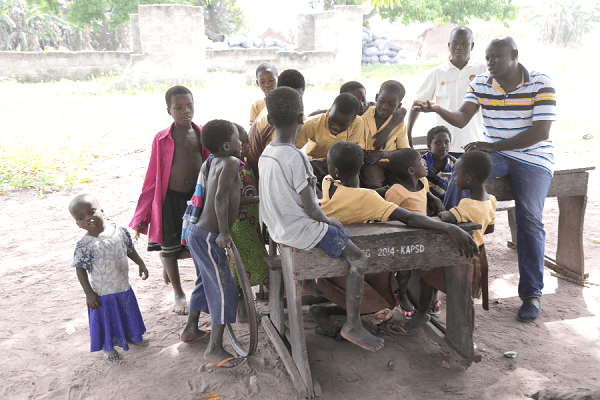
Alezuma Basic School at mercy of weather as pupils study under tree for more than two decades
The Alezuma Basic School at Alezuma in the Kwahu Afram Plains South has been operating under a mango tree, for over 20 years now. The school, which is from Primary One to Three, is run by a headteacher and two other teachers who combine the classes to teach.
The classrooms and the staff common rooms all share the space under the mango tree. When the school is in full session, blackboards are positioned at vantage points under the tree for Primary One to Three, while the pre-school children are handled under a different tree.
The school library is in the hall of the residence of the head teacher in Maame Krobo and the day the children need books from the library, the head teacher has to convey the books from his hall to the school for use.
For the schoolchildren in Alezuma, footwear is a luxury and those whose parents are able to buy them bathroom slippers are envied by their mates.

Rev Fr Stephen Sakpaku, the Parish Priest of the St Joseph the Worker Catholic Church at Maame Krobo interacting with the pupils
No structures
The Alezuma Basic School has been in existence for over two decades, first as a private school and later absorbed as a public school, but has never seen a school block. The only structure, which was started by the former Member of Parliament (MP) for Afram Plains South, Mr Joseph Appiah Boateng, was abandoned as it was considered a death trap by the regional engineers because the structure was built without iron rods.
The sad aspect of it all is that the people in the area see their situation as normal to study under trees. After all, the current head teacher of the school studied under the same tree when it was a private school and has gone through the college of education, through to the university and has come back to meet the same classroom – under the mango tree — now a public school.
Ghana Education Service
The students are given one break at lunch time and they are allowed to go back home, prepare lunch and eat before returning to school to continue with the classes. The irony is that it is not that the management of the Ghana Education Service (GES) and the district assembly are not aware of the state of the community school.
A look at the log book of the school revealed that the Circuit Supervisor visits every other week and even the District Chief Executive has visited the school under tree in recent times.
And what a sorrowful sight it is to see the schoolchildren exposed to the devastating weather of the scorching sun, especially when the mango tree sheds its leaves, while the school session comes to an abrupt end with the change of weather.

Mr Fodjour (right) taking this reporter through the log book in the “staff common room” under the tree
When the Daily Graphic visited the school, it was a pathetic scene as some of the pupils were virtually naked, sitting on the few available tables. A look around revealed a heap of damaged school chairs and tables at the base of the mango tree.
According to the school, the pupils are made to carry their chairs to school always, since the few tables and chairs in the school have broken down due to the effect of the harsh weather conditions.
Even though the school has a vast land for development, it has been neglected as nothing is on it. A charcoal burner has taken advantage of the situation to use the land to burn his charcoal to sell.
SDG Four
The state of the Alezuma Basic School brings into question whether we are really on course to attaining the Sustainable Development Goal (SDG) Four which, among others, seeks to ensure that all children of school age are in school and have access to quality education.
It states that obtaining quality education is the foundation to creating sustainable development. The SDG Four states that in addition to improving the quality of life, access to inclusive education can help equip locals with the tools required to develop innovative solutions to the world’s greatest problems.
Ghana may be achieving the target in terms of enrolments, but may still have more work to do with regard to the quality, as can clearly be seen by the situation of the Alezuma Basic School.
During an interaction with the children, they expressed high hopes and ambitions of becoming “school madams” (heads of schools), army officers, KIA drivers, teachers and police officers.
But surely the pupils in this school have no chance of realising their ambitions if their plight is not addressed as the environment they find themselves in, is nowhere near the required conducive teaching and learning environment.

The structure which was started by Mr Boateng but had to be pulled down
Drop in population
Briefing the Daily Graphic, the Head Teacher of the school, Mr Elijah Fodjour, said currently the number of the pupils had dropped significantly because of the state of the school. He said some of the pupils were either at home or were given bicycles as the means of transport to attend school in Maame Krobo, about five kilometres away from the village.
According to the head teacher, all he needed was a decent school structure and he would be able to convince those dropping out not to and even those who had relocated to Maame Krobo to come back to the school.
He explained that formerly the school had classes from pre-school to Primary Six but because of its current state, most parents who could afford had bought bicycles for their children to attend school at Maame Krobo and that explained the decision of the GES to reduce the school’s classes to Primary Three.
